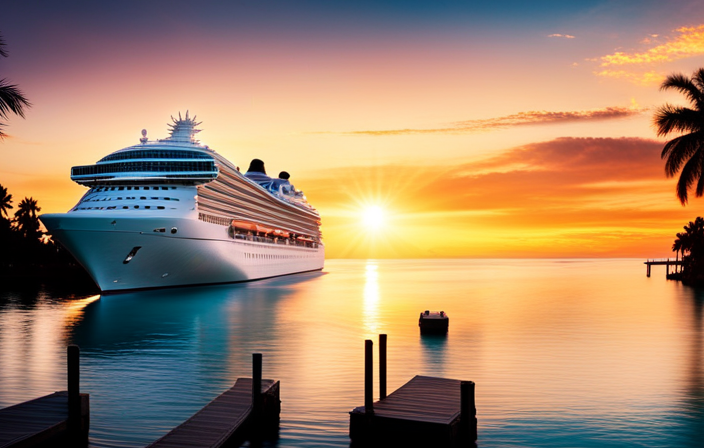Numerous people imagine vacations on cruise ships as tranquil and enjoyable ventures across the expansive seas. However, similar to other environments, crimes can occur in these floating cities.
In this article, I will delve into the fascinating world of what happens if you commit a crime on a cruise ship. From understanding jurisdiction to reporting a crime, from investigations to legal proceedings, and from punishments to penalties, we will explore the different aspects of this complex issue.
Through high-profile crime cases, we will also shed light on the safety measures and crime prevention strategies implemented by cruise ship companies. Furthermore, we will delve into the challenges faced in terms of international cooperation and the complexities of navigating legal systems across different countries.
So, if you’ve ever wondered about the consequences of committing a crime on a cruise ship, buckle up and join me on this intriguing journey.
Key Takeaways
- Jurisdiction on a cruise ship is determined by the location of the ship at the time of the crime, and different laws may apply depending on the location.
- The types of crimes committed on cruise ships include theft and pickpocketing, assault and violence, and drug possession and trafficking.
- Passengers should take precautions to prevent crimes such as assault and violence, and should immediately report any suspicious behavior to ship personnel.
- Reporting a crime on a cruise ship should be done immediately to ship’s security personnel or management, and collaboration between ship’s security and law enforcement is crucial for a thorough investigation.
Understanding Jurisdiction on Cruise Ships
When you’re on a cruise ship, understanding jurisdiction can be crucial in determining who has the authority to enforce laws and handle crimes. Understanding legal responsibilities and the international maritime laws is essential to comprehend the legal framework that governs these floating cities.
Cruise ships are unique because they are registered in one country but often travel through the territorial waters of multiple countries. This means that depending on the location of the ship at the time of the crime, different laws may apply.
Additionally, cruise lines often have their own security personnel who can detain individuals suspected of committing a crime until they can be handed over to the appropriate authorities. Therefore, it is important to know the legal boundaries and procedures onboard a cruise ship to ensure compliance and proper handling of any criminal activities.
Now, let’s delve into the types of crimes committed on cruise ships.
Types of Crimes Committed on Cruise Ships
When it comes to crimes committed on cruise ships, there are several types that can occur.
One common crime is theft and pickpocketing, where passengers may have their belongings stolen or be targeted by skilled pickpockets.
Another type of crime is assault and violence, which can range from altercations between passengers to more serious incidents involving crew members.
Finally, drug possession and trafficking is also a concern on cruise ships, with individuals attempting to bring illegal substances on board or engage in illicit activities.
Theft and Pickpocketing
Beware, for if you dare to commit theft or engage in pickpocketing on a cruise ship, the consequences will swiftly and mercilessly descend upon you. Cruise ships take the safety and security of their passengers seriously, implementing various measures to prevent theft and deal with pickpocketing incidents.
Here are two important strategies they employ:
-
Enhanced Surveillance: Cruise ships utilize advanced security systems, including CCTV cameras and security personnel, to monitor public areas and detect any suspicious activity. This serves as a deterrent to potential thieves and enables swift identification and apprehension of pickpockets.
-
Security Training: Cruise ship staff undergo rigorous security training to handle theft and pickpocketing situations. They are trained to be vigilant, recognize suspicious behavior, and respond appropriately to prevent thefts and assist victims.
With theft and pickpocketing being taken seriously, it is essential for cruise ship passengers to feel safe and protected.
However, theft is not the only crime that can occur on a cruise ship. Transitioning into the subsequent section about ‘assault and violence,’ it is important to be aware of the potential risks onboard.
Assault and Violence
Stay vigilant and ensure your safety by being aware of the potential risks of assault and violence while on a cruise ship.
While cruise ships are generally safe environments, it’s important to take precautions to prevent any incidents. Cruise ship security is typically well-trained and equipped to handle such situations, but it’s still essential to remain cautious.
Avoid isolated areas, especially at night, and always travel with a companion whenever possible. Be mindful of your surroundings and report any suspicious behavior to ship personnel immediately.
Additionally, familiarize yourself with the ship’s security protocols and emergency procedures. By taking these steps, you can help protect yourself and others from potential harm.
Transitioning into the next section, drug possession and trafficking on cruise ships can have serious legal consequences.
Drug Possession and Trafficking
Despite the allure of a luxurious vacation, cruise ships can become a haven for drug possession and trafficking, inviting a not-so-pleasant surprise for those seeking adventure.
-
The hidden drug trade on cruise ships is a disturbing reality. Individuals attempt to smuggle illegal substances onboard through various means, such as hiding drugs in personal belongings or even using innocent-looking passengers as couriers.
-
Cruise ships often sail through international waters, making it difficult for authorities to monitor and intercept drug trafficking activities. The vast expanse of the ocean provides ample opportunities for criminals to transport drugs across borders and evade detection.
-
If caught with drugs on a cruise ship, the consequences can be severe. Offenders may face legal repercussions in both the country where the ship is registered and the destination ports. Penalties range from fines to imprisonment.
Drug rehabilitation programs may be available for those seeking help after being involved in drug-related incidents on cruise ships. These programs aim to support individuals in overcoming addiction and reintegrating into society.
Transitioning into the subsequent section about reporting a crime on a cruise ship, it is crucial to understand the necessary steps to ensure proper handling of these offenses.
Reporting a Crime on a Cruise Ship
If you witness a crime on a cruise ship, it’s crucial to know how to report it. Reporting procedures for crimes on cruise ships are taken very seriously, as they require immediate action to ensure the safety of all passengers and crew members.
Once you witness a crime, you should immediately notify the ship’s security personnel or the ship’s management. They will take your statement and begin investigating the crime. It’s important to provide as much detail as possible, such as the time, location, and description of the incident and individuals involved.
The ship’s security team will then work closely with law enforcement authorities to further investigate the crime and gather evidence. This collaboration between the ship’s security and law enforcement is essential to ensure a thorough investigation and legal proceedings against the perpetrator.
Investigation and Legal Proceedings
In shipboard investigations, the ship’s security team and officers will gather evidence, interview witnesses, and review surveillance footage to determine what occurred.
If a crime is committed on a cruise ship, local authorities may become involved, depending on where the ship is located at the time of the incident. Interpol, the international police organization, can also assist in coordinating investigations and sharing information between countries.
Once the investigation is complete, the legal procedures and court systems of the relevant jurisdiction will be followed to determine the outcome of the case.
Shipboard Investigations
Shipboard investigations involve a meticulous examination of potential criminal activities that may have occurred on a cruise ship. This reveals a hidden world of intrigue and complex interrelationships.
Shipboard security plays a crucial role in preventing crimes from happening in the first place. Cruise lines employ various crime prevention measures, such as surveillance cameras, security personnel, and strict access control. These measures are put in place to deter criminal behavior.
In case a crime does occur, shipboard investigations are initiated. The purpose of these investigations is to gather evidence, interview witnesses, and identify the perpetrators. Trained security officers conduct these investigations, working closely with the ship’s crew and passengers. This collaboration ensures a thorough and unbiased examination of the incident.
Once shipboard investigations are complete, the involvement of local authorities and Interpol may be necessary. This is to ensure proper legal proceedings and the enforcement of justice.
Involvement of Local Authorities and Interpol
In 2019, Interpol facilitated the arrest of over 1,200 individuals involved in maritime crime worldwide. The involvement of local authorities is crucial in these investigations as they provide on-the-ground support and jurisdiction. Interpol acts as a coordinating body, working closely with local law enforcement agencies to share intelligence, coordinate operations, and apprehend criminals.
This collaboration ensures that individuals involved in crimes committed on cruise ships are held accountable, regardless of their location.
The involvement of Interpol and local authorities in shipboard investigations highlights the importance of international cooperation in solving maritime crimes. It demonstrates the commitment of law enforcement agencies worldwide to maintain security and safety on the seas.
Moving forward, it is essential to understand the legal procedures and court systems that govern these investigations to ensure justice is served.
Transitioning to the subsequent section, legal procedures and court systems play a crucial role in the resolution of shipboard crimes.
Legal Procedures and Court Systems
After the involvement of local authorities and Interpol, it is important to understand the legal procedures and court systems that come into play when a crime is committed on a cruise ship. Maritime law governs these situations and differs from traditional land-based legal systems. It takes into account the unique circumstances of crimes committed at sea and provides guidelines for handling them.
Understanding maritime law is crucial in order to navigate the legal process effectively. Additionally, crimes committed on a cruise ship can have a significant impact on the reputation of the cruise line. News of criminal incidents can deter potential passengers and damage the trust and confidence of current passengers. Therefore, cruise lines have a vested interest in ensuring that crimes are taken seriously and appropriately addressed.
With an understanding of the legal procedures and the impact on reputation, it is important to consider the punishments and penalties that may be imposed in these cases.
Punishments and Penalties
If you break the law on a cruise ship, you better brace yourself for the severe punishments and penalties that await you. Understanding sentencing guidelines is crucial because the penalties for committing a crime on a cruise ship can vary depending on the severity of the offense.
For minor crimes, such as theft or disorderly conduct, you may face fines or temporary confinement on the ship. However, for more serious crimes like assault or drug trafficking, you could be prosecuted and sentenced to imprisonment upon reaching the next port.
These punishments not only serve to protect the safety of passengers and crew but also have a significant impact on the cruise ship industry. Cruise lines strive to maintain a safe and secure environment to protect their reputation and ensure passenger satisfaction. It is essential for passengers to be aware of these penalties and act responsibly during their voyage.
As we move into the next section about passenger rights and legal protections, it is important to understand the consequences of breaking the law on a cruise ship.
Passenger Rights and Legal Protections
After discussing the punishments and penalties for committing a crime on a cruise ship, let’s now delve into the important topic of passenger rights and legal protections.
As a passenger aboard a cruise ship, it is crucial to understand the rights and protections afforded to you in case you become a victim of a crime or face any other legal issues during your voyage.
Cruise lines have a responsibility to ensure the safety and well-being of their passengers, and this includes providing compensation for any harm suffered. Additionally, passengers have the right to legal representation and can seek legal recourse if their rights are violated.
These legal protections aim to ensure that passengers are not left helpless in the face of any criminal activity or legal challenges that may arise during their cruise.
Moving forward, let’s explore high-profile crime cases on cruise ships and the impact they have had on the industry.
High-Profile Crime Cases on Cruise Ships
Delve into the dark underbelly of the cruise industry, where sinister tales of high-profile crime cases lurk like hidden treasures waiting to be unearthed. Cruise ship crime statistics reveal a disturbing reality that can impact the tourism industry. While the majority of cruise vacations are safe and enjoyable, there have been notable instances of criminal activity onboard. These incidents, although relatively rare, have garnered significant media attention and raised concerns among potential cruise passengers. To illustrate the gravity of the situation, consider the following high-profile crime cases:
| Case | Description | Outcome |
|---|---|---|
| Disappearance of Amy Lynn Bradley | Amy Lynn Bradley vanished from a cruise ship in 1998, and her case remains unsolved. | No resolution to date. |
| Murder of George Smith IV | George Smith IV disappeared during his honeymoon cruise in 2005, and his body was never found. | Investigation inconclusive. |
| Sexual Assault on Carnival Cruise | A passenger was sexually assaulted while aboard a Carnival cruise ship in 2018. | Perpetrator arrested and convicted. |
| Disappearance of Rebecca Coriam | Rebecca Coriam went missing from a Disney cruise ship in 2011, and her case remains a mystery. | No resolution to date. |
These high-profile cases highlight the need for safety measures and crime prevention onboard cruise ships. By implementing stricter security protocols and ensuring prompt and thorough investigations, the industry aims to protect passengers and maintain the trust of the public.
Safety Measures and Crime Prevention
Implementing stricter security measures and proactive crime prevention protocols on cruise ships ensures the safety and peace of mind for every passenger on board. Cruise ship security protocols have become increasingly robust in recent years, with the aim of deterring and preventing criminal activities.
From enhanced surveillance systems to access control measures, cruise ships are equipped with state-of-the-art technology to monitor and safeguard passengers and crew members alike.
In addition, crime prevention training for cruise ship staff plays a crucial role in maintaining a secure environment. Crew members are trained to identify and report any suspicious behavior or potential threats, ensuring quick response and resolution.
By prioritizing safety and implementing these measures, cruise lines strive to create an enjoyable and secure experience for all passengers.
Transitioning into the subsequent section about international cooperation and legal challenges, it is important to address the measures taken to combat crime across different jurisdictions.
International Cooperation and Legal Challenges
When it comes to international cooperation and legal challenges, there are three key points to consider:
-
Differences in jurisdiction and legal systems: Jurisdiction and legal systems can vary greatly from country to country, making it difficult to determine which laws apply in cases involving multiple nations.
-
Extradition treaties: Extradition treaties are agreements between countries that allow for the transfer of individuals accused of a crime from one country to another for prosecution.
-
Mutual legal assistance: Mutual legal assistance involves countries working together to gather and exchange evidence and information in criminal investigations.
These factors present significant challenges in international cooperation and require careful consideration to ensure effective collaboration between nations.
Differences in Jurisdiction and Legal Systems
If you commit a crime on a cruise ship, you may find yourself caught in a complex web of jurisdictional issues and varying legal systems.
Did you know that approximately 80% of crimes committed on cruise ships involve theft or vandalism? Understanding maritime law is crucial in these cases, as it governs crimes committed within international waters.
Additionally, there are legal implications for cruise ship employees who may be involved in criminal activities. Each country has its own jurisdictional authority, which further complicates the situation.
The resolution of these cases often requires international cooperation and adherence to extradition treaties and mutual legal assistance agreements. These agreements allow for the transfer of the accused individuals to the jurisdiction where the crime was committed for prosecution.
With this in mind, let’s delve into the next section about extradition treaties and mutual legal assistance.
Extradition Treaties and Mutual Legal Assistance
Navigating the intricate web of extradition treaties and mutual legal assistance can often leave you feeling overwhelmed and disoriented. When it comes to crimes committed on a cruise ship, extradition processes and international legal cooperation play a crucial role in bringing the offender to justice. Here are four key points to understand about this complex system:
-
Extradition treaties: These agreements between countries allow for the extradition of individuals who have committed crimes in another jurisdiction. Cruise ship crimes may fall under the jurisdiction of the country where the ship is registered or the nationality of the perpetrator.
-
Mutual legal assistance: This process involves countries cooperating with each other to gather evidence and provide legal support in criminal cases. It helps ensure a smooth flow of information and cooperation between the relevant authorities.
-
Time-consuming procedures: Extradition processes and mutual legal assistance can be lengthy and complicated. They often involve multiple legal systems, paperwork, and diplomatic negotiations, which can delay the resolution of the case.
-
Importance of international cooperation: To effectively address crimes on cruise ships, international legal cooperation is paramount. It helps overcome jurisdictional challenges and enables authorities to hold offenders accountable.
Understanding these extradition processes and international legal cooperation is essential for cruise ship passengers seeking justice. In the subsequent section, we will explore the conclusion and provide advice for cruise ship passengers.
Conclusion and Advice for Cruise Ship Passengers
To make the most of your cruise experience, remember to heed the conclusion and advice for cruise ship passengers. Ensuring passenger safety and preventing crime should be a top priority for everyone on board. Here are some key tips to keep in mind:
| Safety Tip | Crime Prevention Tip |
|---|---|
| Familiarize yourself with the ship’s emergency procedures and evacuation routes. | Always lock your cabin when you leave and store valuables in the ship’s safe. |
| Be aware of your surroundings and report any suspicious activity to the ship’s security. | Avoid displaying large amounts of cash or expensive jewelry. |
| Stay in well-lit areas, especially at night, and travel in groups if possible. | Use reputable tour operators when going ashore and avoid unsolicited offers. |
| Practice safe alcohol consumption and never accept drinks from strangers. | Keep a close eye on your belongings and be cautious of pickpockets in crowded areas. |
| Follow the ship’s rules and regulations, including curfews and age restrictions. | Report any incidents or crimes to the ship’s security immediately. |
By following these guidelines, you can help ensure a safe and enjoyable cruise vacation for yourself and your fellow passengers.
Frequently Asked Questions
Can I be charged with a crime if the incident occurred in international waters?
Can I really get away with a crime on a cruise ship in international waters? The answer is no. Jurisdiction and international law allow for prosecution of crimes committed on cruise ships, regardless of location.
What happens if a crime is committed by a crew member on a cruise ship?
If a crime is committed by a crew member on a cruise ship, their rights may be protected under labor laws, but jurisdiction issues can complicate the legal process and determine which authorities have the power to investigate and prosecute the crime.
Are there any limitations on reporting a crime that occurred on a cruise ship?
Reporting a crime on a cruise ship may have limitations due to jurisdictional issues and the complex nature of cruise ship crimes. Legal challenges in prosecuting such crimes can arise from varying laws and the transient nature of passengers and crew.
How are crimes on cruise ships investigated and by whom?
Cruise ship crime investigation is complex due to legal jurisdiction on cruise ships. Depending on the nature of the crime, it may involve cooperation between ship security, local law enforcement, and sometimes even international authorities.
Are there any specific legal challenges in prosecuting crimes that occur on cruise ships?
Legal jurisdiction and challenges in prosecution arise when crimes occur on cruise ships. These unique legal challenges can include determining which country’s laws apply, gathering evidence from international waters, and coordinating with multiple law enforcement agencies.
What are the Legal Consequences of Committing a Crime While a Cruise Ship is at Sea?
When a cruise ship is at sea, the legal consequences of committing a crime can be complex. Depending on the jurisdiction, the cruise ship leaving port terminology will determine which laws apply. However, most cruise ships adhere to maritime law and have their own security measures in place to handle criminal activity.
Conclusion
In conclusion, if you find yourself on a cruise ship, it’s important to be aware of the potential consequences of committing a crime. The jurisdiction on cruise ships can be complex, but authorities will ensure that investigations and legal proceedings take place. Punishments and penalties will be handed out accordingly.
By understanding safety measures and actively preventing crime, passengers can create a secure environment for all. It’s crucial to remember that international cooperation and legal challenges may arise, underscoring the seriousness of committing a crime on a cruise ship.










